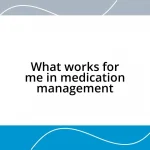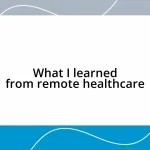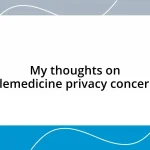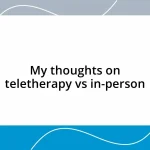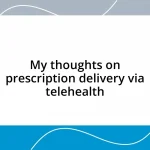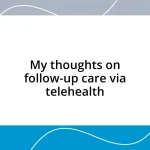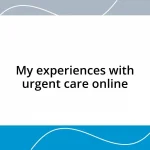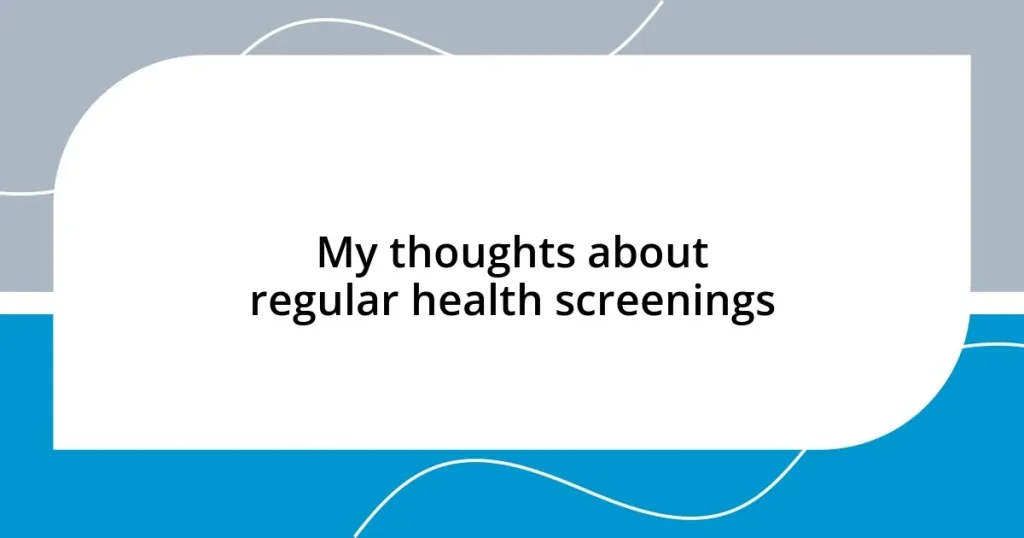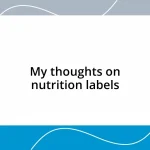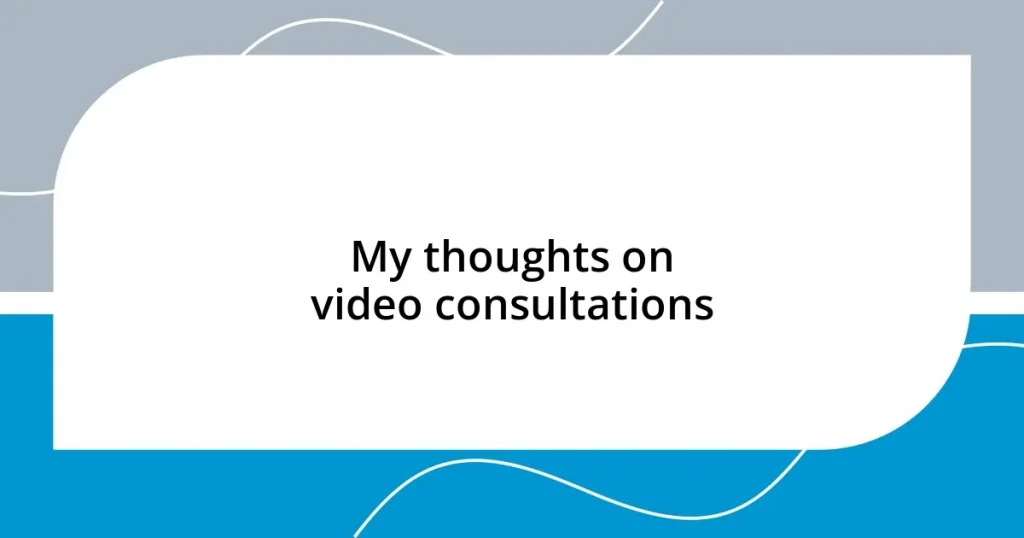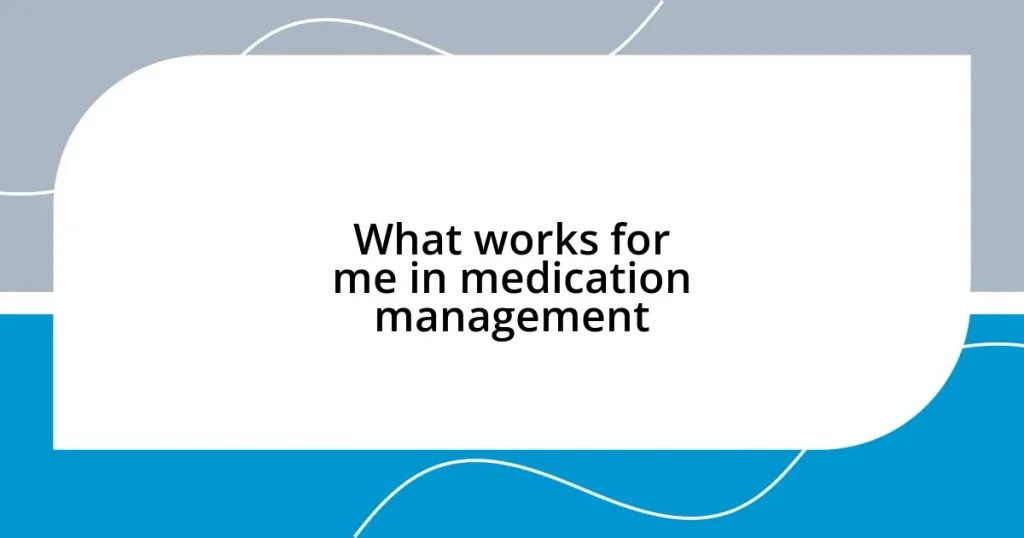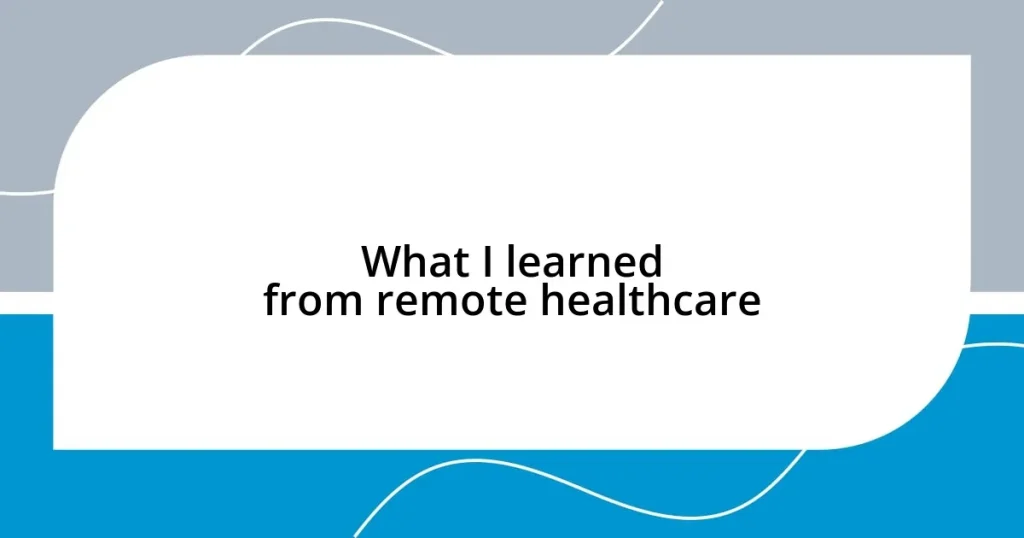Key takeaways:
- Regular health screenings help identify potential issues early, leading to proactive lifestyle changes and peace of mind.
- Screenings should be age-appropriate, adapting to evolving health risks as one grows older.
- Understanding screening results and engaging with healthcare providers can empower individuals to take charge of their health.
- Early detection through screenings not only improves health outcomes but can also prevent costly treatments down the line.
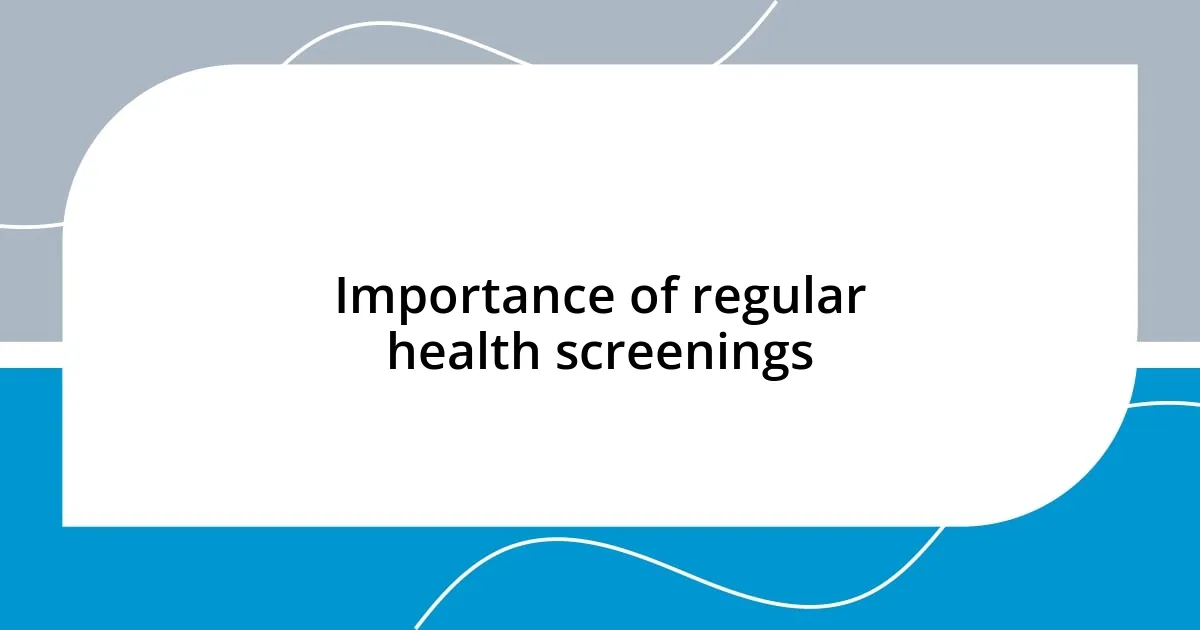
Importance of regular health screenings
Regular health screenings are crucial because they can catch potential health issues before they develop into serious problems. I remember when I had my first cholesterol test; it felt like a mere formality. But when the results showed elevated levels, it pushed me to change my diet and lifestyle. Have you ever had an experience where a small check-up led to significant change? It’s those moments that truly highlight the importance of proactive health monitoring.
Another aspect that often gets overlooked is the peace of mind regular screenings can bring. There’s a certain relief that comes with knowing your health is in check. I recall a friend who feared she might be at risk for diabetes; but after her screening revealed normal blood sugar levels, it was such a weight off her shoulders. How often do we let worries about our health linger, when a simple screening could ease those fears?
Moreover, regular screenings play a pivotal role in identifying risk factors that may run in families. For instance, my family has a history of hypertension, and I decided to undergo blood pressure checks regularly. It’s empowering to take charge of my health proactively rather than waiting for symptoms to appear. Have you thought about how your family history might influence your own health screening habits? It’s something worth considering, as early detection can lead to better management and outcomes.
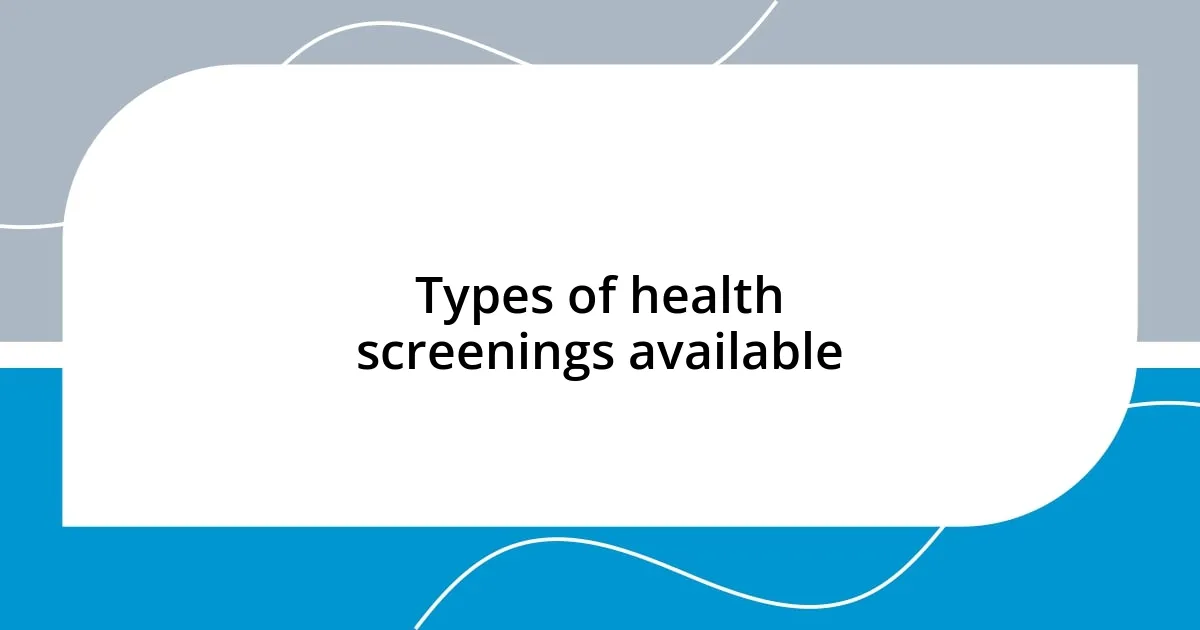
Types of health screenings available
There’s a wide variety of health screenings available, tailored to detect different health issues. During my annual check-up, I was surprised to learn about screenings I hadn’t even considered, like those for colon cancer that start at age 45. I’ve always believed in being informed; knowing what screenings are out there empowered me to have conversations with my doctor that were both insightful and reassuring.
Here’s a brief overview of some common health screenings:
- Blood Pressure Screening: Essential for identifying hypertension, which can lead to serious conditions like heart disease.
- Cholesterol Screening: Measures total cholesterol, LDL, HDL, and triglycerides to assess heart health.
- Blood Sugar Testing: A key indicator in diagnosing diabetes or pre-diabetes conditions.
- Mammograms: Recommended for women to check for early signs of breast cancer, typically starting at age 40.
- Pap Smears: Important for women to detect cervical changes that may lead to cancer.
- Colonoscopy: A screening for colon cancer, generally starting at age 45, which I personally found crucial after hearing about my uncle’s struggles with the disease.
Each of these screenings brings its unique set of benefits, but what really struck me was how they can create a proactive approach to my health. I acknowledge that the thought of getting screened makes some people anxious; I felt the same way about my first mammogram. Yet, experiencing that anxiety firsthand made me appreciate the importance of these tests even more. There’s a sense of empowerment in taking steps to understand one’s health better. Have you explored which screenings are right for you based on your age and risk factors? It’s a conversation worth having with your healthcare provider.
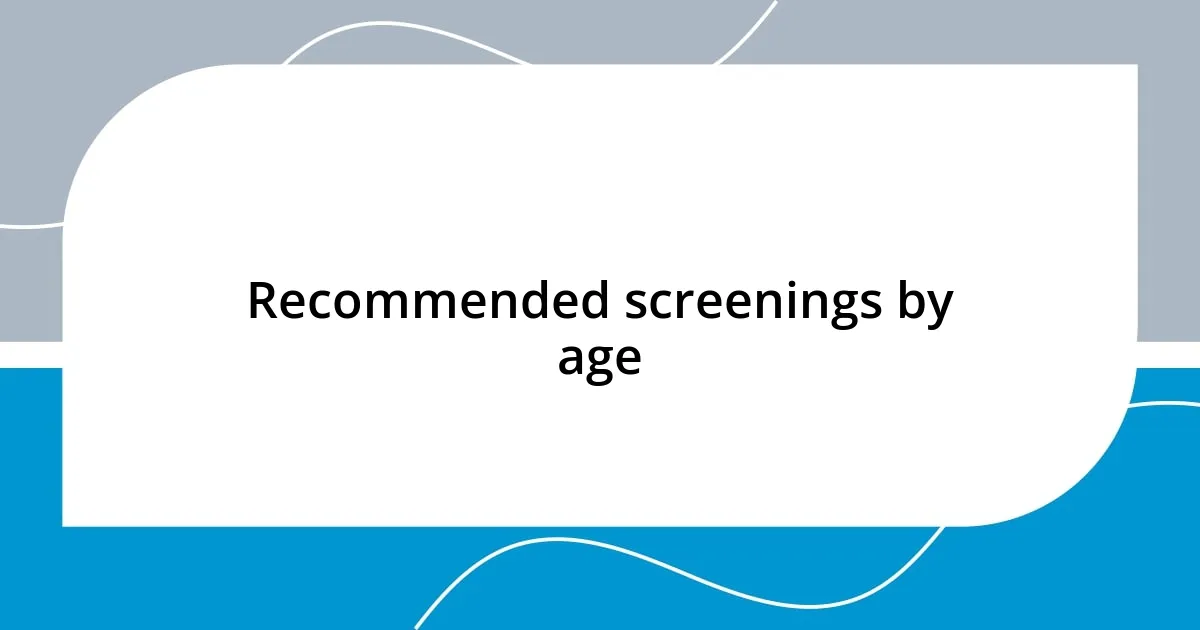
Recommended screenings by age
Recommended screenings should be age-appropriate because our health risks evolve as we grow older. For instance, I remember turning 50 and the sudden realization that I needed to schedule my first colonoscopy. The process sounded intimidating, but I found reassurance in knowing it was a critical step in preventing colon cancer. Have you thought about how much more we should value these screenings with age? It really puts things into perspective.
As we reach certain milestones in life, guidelines recommend specific screenings to catch potential issues early. At 20, I had my first cholesterol test, which I thought was premature, but it turned out to be a wake-up call that kept my heart health on track later. By the time I hit 40, regular mammograms had become my new normal, a necessary reminder to prioritize my health. Isn’t it interesting how our screenings should evolve in tune with our life’s journey?
| Age Group | Recommended Screenings |
|---|---|
| 20-30 years | Blood pressure, cholesterol, and blood sugar screenings if at risk |
| 40-49 years | Mammograms, cholesterol, blood pressure, and diabetes screenings |
| 50 years and older | Colonoscopy, mammograms, regular blood pressure, cholesterol, and diabetes screenings |
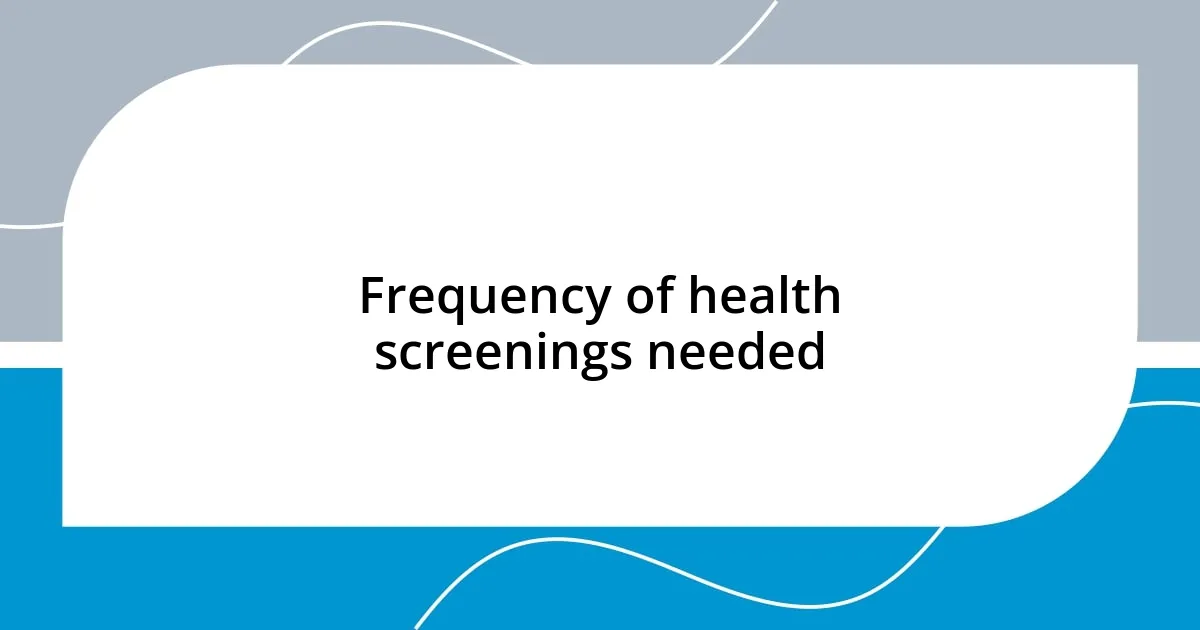
Frequency of health screenings needed
Screening frequency often depends on individual health needs and risk factors, which is something I’ve had to consider more deeply over the years. For example, my doctor recommended I come in every year for basic screenings like blood pressure and cholesterol after a family member experienced heart issues. Have you thought about how certain family histories can shape our screening schedules?
When it comes to more invasive tests like colonoscopies, the suggestions generally encourage a five to ten-year interval if results are normal. I remember the relief I felt after my first screening, knowing that I was proactively looking out for my health. It’s crazy to think that one simple procedure could potentially save lives. How often do we underestimate the impact of such screenings?
As we age, the conversation around frequency becomes even more crucial. I know I felt a sense of anxiety leading up to my yearly mammograms, but I also realized how significant they were in detecting issues early on. Isn’t it fascinating how these moments can transform from fear to empowerment with a little knowledge? Regular consistency with screenings can feel overwhelming but think of it as investing in your future health and well-being.
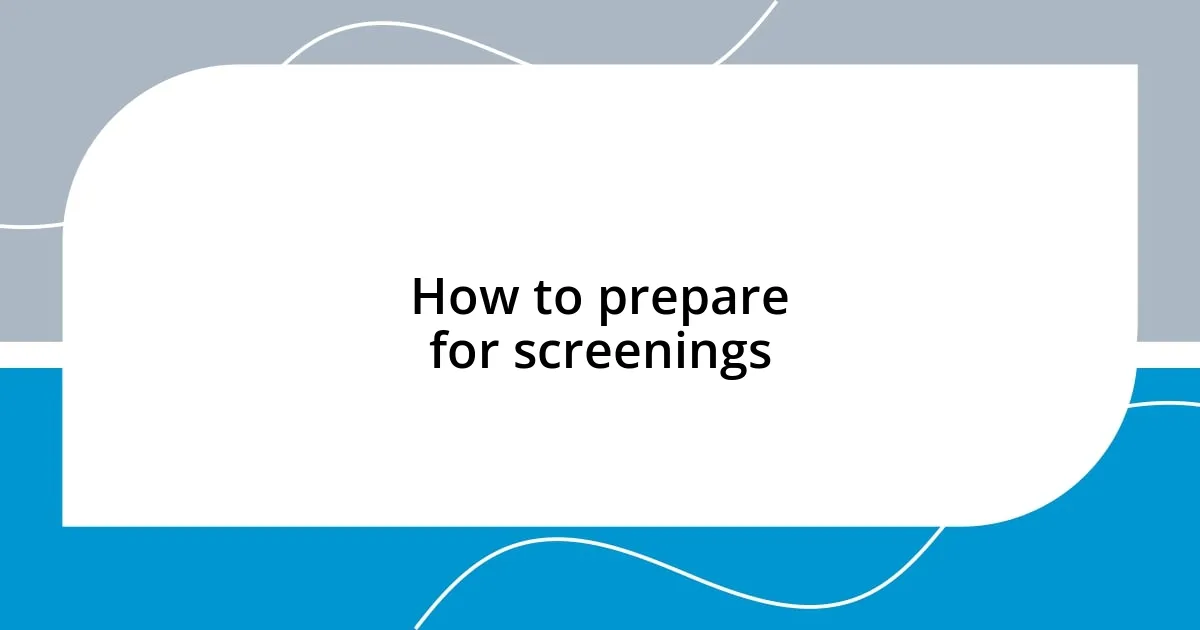
How to prepare for screenings
Preparing for health screenings can be a little daunting, but I’ve learned that a few simple steps can make the experience much smoother. First, it’s crucial to know what screenings you need based on your age and risk factors. I always jot down any symptoms or concerns I’ve been experiencing before an appointment, so I don’t forget to mention them. Have you ever walked out of a doctor’s office realizing you didn’t mention something important? It’s definitely a feeling I want to avoid!
On the day of the screening, I make sure to follow any specific instructions provided by the healthcare provider. For instance, before a blood test, I once forgot to fast overnight and had to reschedule. It was frustrating, but now I set reminders on my phone to ensure I’m fully prepared. Isn’t it funny how a little planning can save us from potential setbacks?
Finally, I focus on calming my nerves. Screening days can be stress-inducing, so I try to practice deep breathing or bring along a comforting item, like a lucky charm or a favorite playlist, to help ease my anxiety. I’ve found that approaching these moments with a positive mindset transforms what could be a stressful event into an opportunity to take charge of my health. How about you? What helps you stay calm when facing screenings?
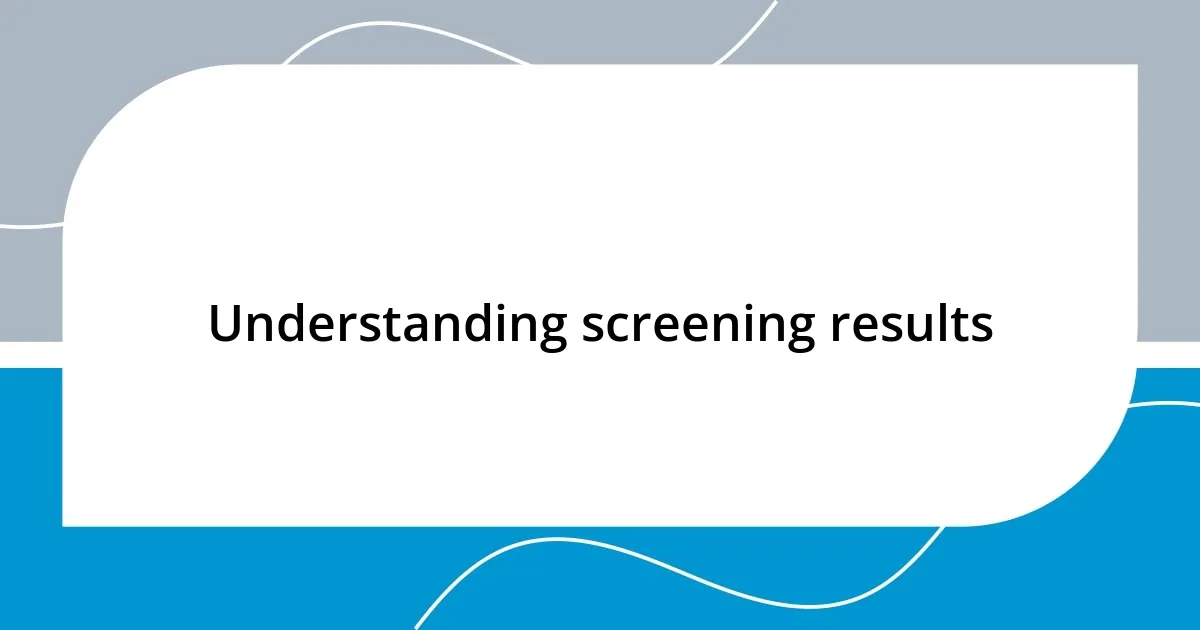
Understanding screening results
Understanding the results of your health screenings can feel like deciphering a foreign language at times. I remember sitting in my doctor’s office, looking at my cholesterol numbers and wondering what they really meant for my overall health. Is it just me, or don’t these figures sometimes seem overwhelming? It wasn’t until my doctor took the time to break down each number that I felt a sense of clarity.
When I received results that indicated elevated blood sugar levels, my heart sank for a moment. The word “pre-diabetes” felt heavy, but after discussing what it meant, I realized it was more about taking proactive steps than just receiving a label. Have you ever experienced that mix of anxiety and relief after getting results? Understanding that you can change your health trajectory with lifestyle adjustments can be incredibly empowering.
It’s essential to remember that not all results are black and white. I once had a screening that showed a borderline abnormal finding, which left me in a whirlwind of concern. My doctor calmly explained how such results can fluctuate and emphasized the importance of follow-up tests. That conversation helped me see the bigger picture: screenings are just a snapshot of your health at a moment in time, not a definitive verdict. How do you approach results that leave you feeling uncertain? Engaging with your healthcare provider can make all the difference in turning apprehension into action.
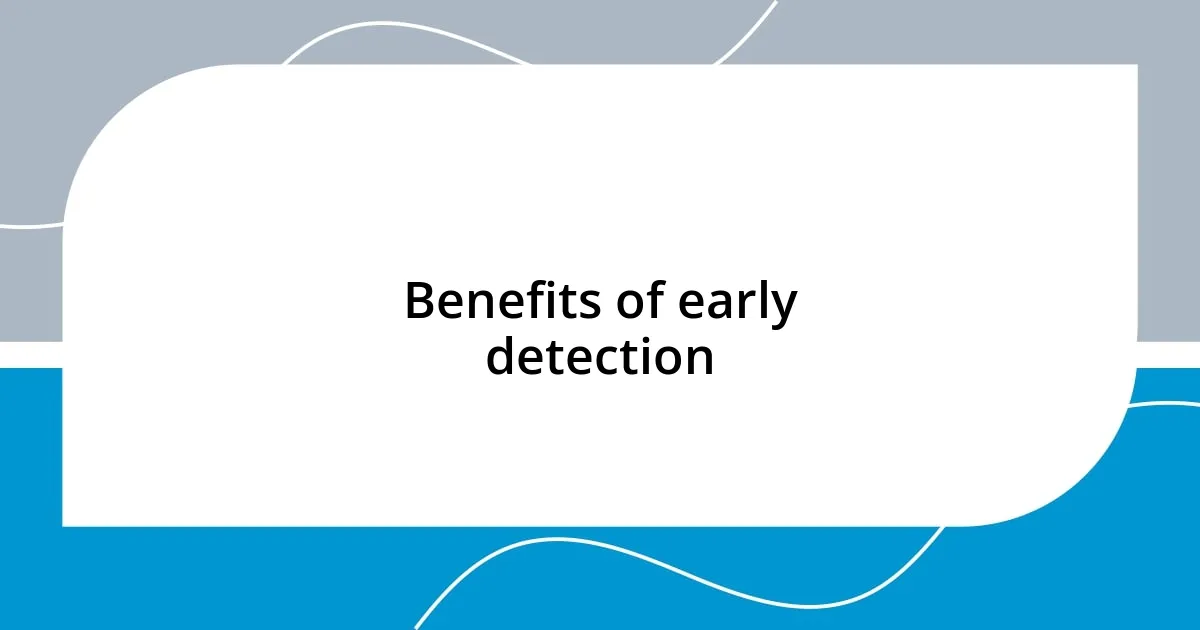
Benefits of early detection
Early detection through regular health screenings brings a wealth of benefits that I’ve come to appreciate over the years. One of the most reassuring experiences for me was when my doctor found a small abnormality during a routine screening. It turned out to be nothing serious, but the peace of mind that came from knowing I had caught it early was invaluable. Have you ever had that moment of relief when a potential concern is addressed sooner rather than later?
The financial aspect of early detection cannot be overlooked either. I learned this firsthand when a screening uncovered a health issue that could have required costly treatment down the line if left unchecked. By addressing it promptly, I not only safeguarded my health but also saved myself from potential financial strain. Doesn’t it make sense to invest in early screenings rather than face larger bills later on?
Perhaps most importantly, I find that early detection allows me to take an active role in my health. During one screening, I discussed lifestyle changes with my doctor that ultimately led to improved fitness and vitality. An unexpected benefit was how empowered I felt in making those choices. Wouldn’t it be great if we all felt equipped to steer our health journey according to what we learn from these screenings? Early detection transforms a passive experience into one where we can take control and advocate for ourselves.


